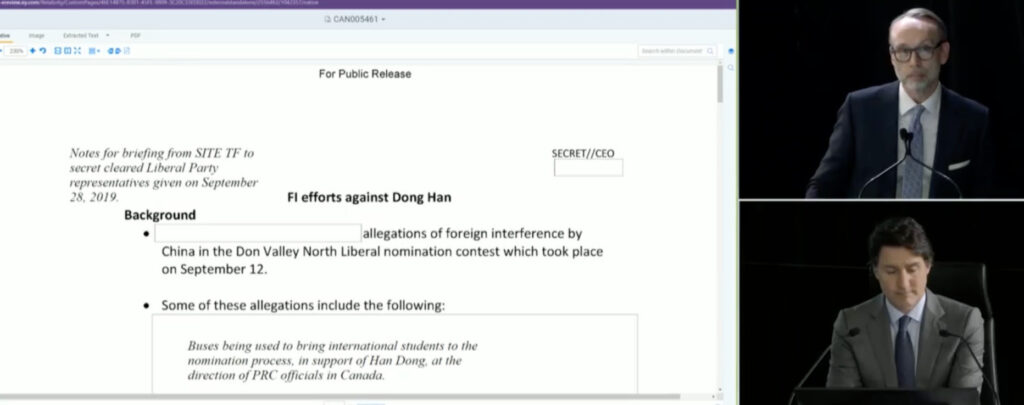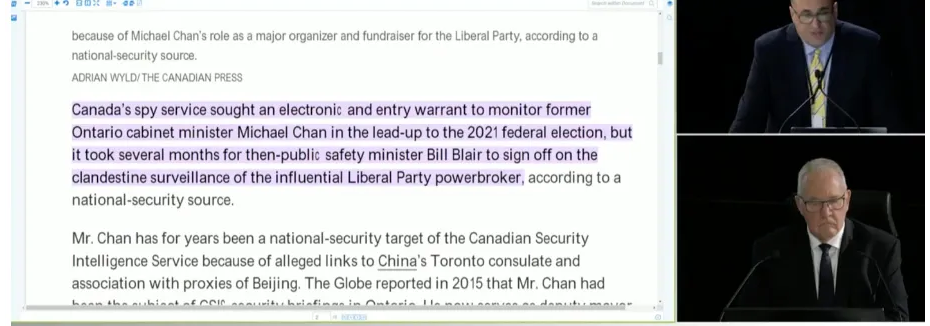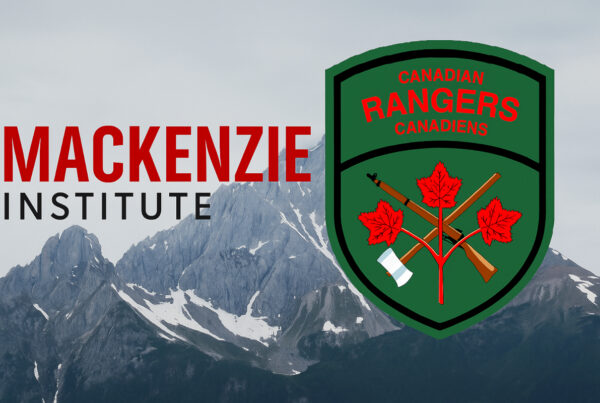Foreign Interference Commission hears Justin Trudeau’s version of September 2019 intel alert

(Written by Sam Cooper. Originally published here in The Bureau, republished with permission.)
Canada’s Prime Minister Justin Trudeau has testified he was briefed on intelligence that Chinese officials likely interfered in MP Han Dong’s Toronto riding by directing international students to vote for Dong, but Trudeau judged CSIS’s intelligence wasn’t solid enough to justify removing his Liberal Party candidate before the October 2019 election.
“The concern is that the People’s Republic of China was directing people, to do their bidding, and to help Han Dong,” a lawyer for Conservative MP Michael Chong pressed Trudeau in an examination Wednesday. “Do you accept there were irregularities in that nomination, and that they were likely tied to the PRC Consulate in Toronto?”
“I’d suggest that a well-grounded suspicion, certainly warranting more reflection or follow up, also might not hit the necessarily very high threshold for overturning the result of the democratic event,” Trudeau answered.
Foreign Interference Commission lawyers in Ottawa have largely focused on CSIS’s allegations in Han Dong’s riding, and what intelligence was shared with Trudeau, his top political staff, and Ottawa’s top security officials, before and after the October 21, 2019 election.
On Tuesday, the day before Trudeau’s examination, the Commission tabled a sanitized record of the information provided to Trudeau’s senior political aide Jeremy Broadhurst on September 28, 2019, which said CSIS’s allegations included: “Buses being used to bring international students to the nomination process, in support of Han Dong, at the direction of PRC officials in Canada.”
For the first time Wednesday, Canadians heard a detailed account from Trudeau about what his aide Broadhurst conveyed about CSIS’s concerns, and what Trudeau’s considerations were in allowing Dong’s candidacy to proceed.
“Mr. Broadhurst met me at the airport in a holding room to let me know of concerns that he had received from the SITE Task Force and CSIS about the nomination campaign,” Trudeau told Commission lawyers.
“He shared with me that intelligence services had shared with him concerns that Chinese officials in Canada had been developing plans to possibly engage in interference in the nomination contest, specifically by mobilizing buses filled with, either buses full of students, or buses filled with Chinese diaspora members, who would be mobilized to support Han Dong.”
Trudeau said he asked Broadhurst “whether or not CSIS had information that Han Dong knew about this, whether he was witting and aware that Chinese officials had mobilized buses for him or not. And the answers were not clear from CSIS at that point, according to what Mr. Broadhurst told me.”
Trudeau said faced with a “binary choice” he decided there wasn’t sufficient intelligence to replace Han Dong with another candidate.
Commissioner Marie-Josée Hogue pressed Trudeau on whether given what he knew of CSIS’s concerns ahead of the October 2019 vote, whether he asked for further investigations.
“So did you revisit that after the elections?” Hogue asked.
Trudeau claimed his party followed up and “verifications were made” but added his party didn’t believe the situation of having students bussed in to vote for Dong’s nomination was unusual.
“We are not a forensic organization,” Trudeau answered.
Minister questioned on CSIS warrant
A number of other Trudeau ministers that were briefed on CSIS’s investigation of Han Dong in the 2019 election were examined Wednesday, including former Public Safety Minister Bill Blair.
Blair testified he wasn’t concerned about the Han Dong intelligence “at the time” of his post-2019 election briefing, and didn’t think “the Don Valley North election results were compromised.”
“I made some inquiries during that briefing with respect to the source of that intelligence,” Blair said, “and my last question, was there any suggestion the candidate was knowledgeable? And they had no information to corroborate that.”
In relation to CSIS’s allegations and intelligence leaks regarding Chinese election interference in 2019 and 2021, Blair was also shown a 2023 Globe and Mail report tabled in Commission evidence and asked to comment on a story paragraph that said:
“Canada’s spy service sought an electronic and entry warrant to monitor former Ontario cabinet minister Michael Chan in the lead-up to the 2021 federal election, but it took several months for then-public safety minister Bill Blair to sign off on the clandestine surveillance of the influential Liberal Party powerbroker.”
“It suggests that there was an undue delay in your signing off on a warrant to surveil Michael Chan in the lead up to the 2021 federal election,” a Conservative Party lawyer told Blair. “Can you comment on why it took you so long to sign off on the warrant?”
“Yeah, let me comment,” Blair shot back. “This paragraph is false.”
“What aspects of it are false, sir?” the Conservative Party lawyer asked.
“It was put in front of me on May 11th, and I signed off the same day, about three hours later,” Blair said.
 Commissioner Hogue ruled questions around Blair’s response to intelligence are outside of the first portion of the Commission’s mandate, and may be addressed in an upcoming round of hearings.
Commissioner Hogue ruled questions around Blair’s response to intelligence are outside of the first portion of the Commission’s mandate, and may be addressed in an upcoming round of hearings.
Last week Michael Chan, who is currently a municipal councillor in Greater Toronto region and has standing in the Commission to respond to evidence, fiercely denied allegations of any wrongdoing in Han Dong’s 2019 nomination, while acknowledging he encouraged Dong to run for Parliament and appeared at Dong’s nomination campaign launch in 2019.
The Commission has also heard that CSIS director David Vigneault took the rare step of twice “recalling” and revising CSIS’s intelligence reports on suspected Chinese interference in Han Dong’s riding.
The first time in October 2019, Vigneault agreed to change the CSIS assessment that a “politically-connected Canadian” had compromised the 2019 election after having an impact in the Don Valley North nomination campaign.
Vigneault redrafted this intelligence after discussing the matter with Trudeau’s then national security advisor in October 2019.
Next, in early 2023, after meeting with Prime Minister Trudeau and his top aides and security officials regarding Han Dong intelligence leaks and media reporting, Vigneault recalled and revised aspects of the 2019 Han Dong intelligence reporting again.
Documents and testimony for the Commission indicated Vigneault made changes at the direction of Trudeau’s then-national security advisor Jody Thomas, and specifically on aspects that Trudeau’s senior political aides believed needed to be corrected.
Trudeau was asked about this meeting on Wednesday but not asked about the specific changes to Han Dong intelligence that followed.
Without giving further context, Trudeau indicated that his team established in this 2023 meeting with Vigneault, that CSIS intelligence that placed him at a June 2019 meeting, was proved to be unreliable.
No further information on what this alleged June 2019 meeting related to, has been heard by the Commission.
Meanwhile, Trudeau’s ministers Dominic LeBlanc and Karina Gould were also questioned on their briefings regarding Dong’s nomination in 2019 and Chinese election interference in 2019 and 2021.
A Conservative Party lawyer pressed Gould on her testimony that both elections were “free and fair.”
“By my count you received seven briefings on foreign election interference,” the Conservative Party lawyer told Gould. “Are you suggesting as a result of those seven briefings you weren’t convinced any foreign interference had taken place in Canadian election processes?”
Gould maintained she didn’t believe either election was impacted, adding “I would just say, the briefings would be [about] a variety of actors.”
The Conservative Party lawyer noted the heading for the document listing Gould’s seven briefs says “CSIS briefings on PRC Foreign Interference in the 2019 and 2021 General Elections.”
“Ok, I didn’t see that,” Gould answered.
Public Safety Minister Dominic LeBlanc was examined on Chinese election interference briefs involving top Trudeau security officials that were provided to LeBlanc in March 2020.
Briefing documents indicated LeBlanc was informed of suspected Chinese interference in the 2019 election, including in the Don Valley North riding, and that “China remained interested in supporting candidates who it perceived would benefit China’s overall strategic interests.”
Sanitized documents related to the brief showed he also heard of China’s contact with candidates and staff and funding of “threat actors.”
But when asked by Commission lawyers if he learned of the same information that had been shared with senior Trudeau security officials and election monitors in October 2019, that Chinese officials allegedly covertly transferred about $250,000 into a pro-Beijing network including 11 candidates, LeBlanc demurred.
“So, again, in this case I learned about this when it became public following leaks,” LeBlanc said. “I wouldn’t have been briefed in this level of granularity.”
sam@thebureau.news








